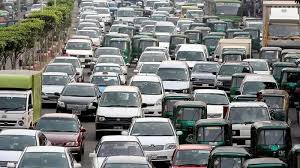Recommendation to limit use of personal vehicles on Dhaka roads
- Update Time : Tuesday, February 4, 2025

TDS Desk:
The government taskforce on re-strategising the economy has recommended limiting use of personal vehicle to release pressure on the capital. Levying tolls on use of road has been suggested. Plus, providing loans on easy terms to purchase cars has been discouraged.
The interim government formed a task force on 10 September last year to re-strategising the economy and mobilising resources for equitable and sustainable development. Planning adviser professor Wahiduddin Mahmud handed over the task force report to chief adviser professor Muhammad Yunus on this 30 January.
This 12-member taskforce was formed with former director general of Bangladesh Institute of Development Studies (BIDS), KAS Murshid in the lead.
Transportation expert and a professor at the department of civil engineering in Bangladesh University of Engineering and Technology (BUET), Shamsul Hoque wrote the section of the taskforce report titled ‘Infrastructure and Connectivity: A Pathway to Economic Prosperity’.
Just as the way people have to spend money for using gas and electricity, suggestions have been made to levy a toll for vehicles on using roads. It has also been proposed to reduce bank loans on easy terms for purchasing cars alongside increasing fines for illegal parking of vehicles.
Recommendations have been made in this section of the report to discourage the use of personal vehicle. For that it has been proposed to fix the number of vehicles that can run in the capital.
Just as the way people have to spend money for using gas and electricity, suggestions have been made to levy a toll for vehicles on using roads. It has also been proposed to reduce bank loans on easy terms for purchasing cars alongside increasing fines for illegal parking of vehicles.
The report recommends that luxury cars not be purchased under any project. It also emphasised on establishing a control over ride-sharing services. With the suggestion of banning vehicles like battery-powered rickshaw, Leguna (human hauler) and Duronto, the taskforce committee has recommended increasing the number of larger and double-decker buses.
The report made recommendations to immediately stop the construction of flyovers in a densely-populated city like Dhaka. It talked about stressing on public transport including buses and trains. However, the report did suggest building flyovers and elevated railways outside of the cities to save cultivable land.
The taskforce report made a proposal to merge the ministries of road transport, railways, shipping and civil aviation together. The reason for that it states is that different ministries and departments take up development projects in their own way. It causes a lack of coordination.
PROPOSAL TO MERGE FOUR MINISTRIES
The taskforce report made a proposal to merge the ministries of road transport, railways, shipping and civil aviation together. The reason for that it states is that different ministries and departments take up development projects in their own way. It causes a lack of coordination.
It creates major complications especially when it comes to land acquisition or land distribution. For instance, when the railways authorities wanted to build Karnaphuli Container Terminal in Chattogrm, the Chittagong Port Authority didn’t agree to allocate land.
Meanwhile, a multimodal hub cannot be built near Shahjalal International Airport due to land-related complications with the Roads and Highways Department, Civil Aviation Authority and the Railways.
For the same reason, Kamalapur Railway Station cannot be turned into a multimodal hub either. There’s a dispute over lands with the Railways centering the Dhaka Elevated Expressway project as well.
While the average speed of vehicles in Dhaka was 25 kilometres per hour back in 1997, it dropped down to 6.7 kilometres per hour coming to 2015. The speed has declined even further now.
RECOMMENDATION TO SHIFT CAPITAL
Citing eight global researches and surveys including global livability index, air quality index and traffic speed index the report stated that Dhaka ranks either the last or near the bottom in every single of these. In this context the taskforce committee has advised shifting the capital from Dhaka in the long term.
“The development that has been done and has been going on in Bangladesh is ‘tangled’ development. That’s why there’s no benefit even after spending billions” said professor, department of civil engineering, BUET.
Mentioning that 85 per cent of the infrastructures in Dhaka are unauthorised and unsuitable for fire protection systems, the report termed it as alarming. While the average speed of vehicles in Dhaka was 25 kilometres per hour back in 1997, it dropped down to 6.7 kilometres per hour coming to 2015. The speed has declined even further now.
The taskforce committee also proposed to establish a coordinated public transport system in the city. The report stated that it would include all types of transportation system like bus route franchise, tram, BRT (Bus Rapid Transit), LRT (Light rail Transit), Monorail, sub urban commuter rail, metro rail and ride sharing.
When asked, professor Shamsul Hoque told that the development that has been done and has been going on in Bangladesh is ‘tangled’ development. That’s why there’s no benefit even after spending billions. The proposals they have made are for untangling. Various countries in the world have been benefited from implementing these.
He added that strong political goodwill is needed to implement the reforms they have proposed in the infrastructure sector. And if the reforms are not carried out falling under the pressure of bureaucracy, no development will prove much useful in future.















